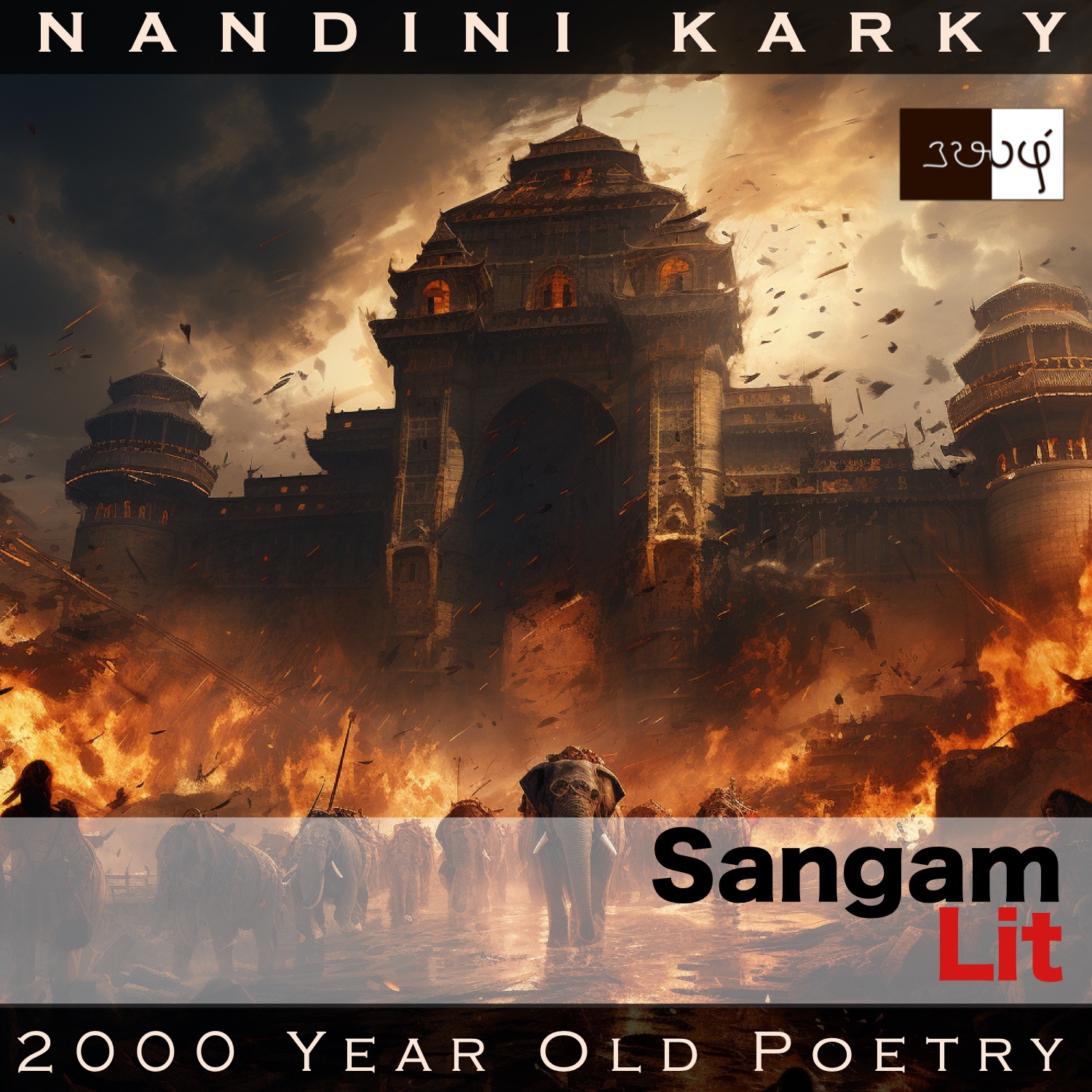Podcast: Play in new window | Download
Subscribe: Apple Podcasts | Spotify | Amazon Music | Android | iHeartRadio | Email | TuneIn | RSS | More
In this episode, we perceive the pitiable state of a poet’s family, as depicted in Sangam Literary work, Puranaanooru 210, penned about the Chera King Kudakko Cheral Irumporai by the poet Perunkundroor Kizhaar. Set in the category of ‘Paadaan Thinai’ or ‘Praise’, the verse echoes the despair felt by the poet.

மன்பதை காக்கும் நின் புரைமை நோக்காது,
அன்பு கண் மாறிய அறன் இல் காட்சியொடு,
நும்மனோரும் மற்று இனையர் ஆயின்,
எம்மனோர் இவண் பிறவலர் மாதோ;
செயிர் தீர் கொள்கை எம் வெங் காதலி
உயிர் சிறிது உடையள்ஆயின், எம்வயின்
உள்ளாது இருத்தலோ அரிதே; அதனால்,
‘அறன் இல் கூற்றம் திறன் இன்று துணியப்
பிறன் ஆயினன்கொல்? இறீஇயர், என் உயிர்!’ என
நுவல்வுறு சிறுமையள் பல புலந்து உறையும்
இடுக்கண் மனையோள் தீரிய, இந் நிலை
விடுத்தேன்; வாழியர், குருசில்! உதுக் காண்:
அவல நெஞ்சமொடு செல்வல் நிற் கறுத்தோர்
அருங் கடி முனை அரண் போலப்
பெருங் கையற்ற என் புலம்பு முந்துறுத்தே.
Dejection reigns supreme in this recent series of Sangam verses. The poet’s words to this Chera king can be translated as follows:
“Without considering your high position of guarding lives, if you and people like you have an unjust and unloving attitude, then it would be better for people like me to not be born in this world! If at all my loving mate, with a faultless virtue, is left with a little life, it would be impossible for her not to think of me; When she does, with much suffering, she would say ‘Would Death, who is filled with injustice, dare to take his life today? O, my life is doomed!’. To end the endless lament of my angst-ridden wife, I part from you. May you live long, O king! Look at this state wherein, with a distressed heart, and with helplessness, akin to that of the inaccessible and well-guarded forts of those who oppose you, as my poverty leads, I follow!”
Let’s take a closer look at this verse. The poet starts by reminding the king that he seems to have forgotten his duty of protecting people and he adds that if every patron were to take on such an uncaring attitude, then it would be better if there were no supplicants at all in this world. From that generic statement about the lack of responsibility of the patrons and the pitiable state of supplicants, the poet arrives closer home and paints a portrait of his virtuous wife. He says she’s sure to have died in pain of the separation and if at all that has not happened and she remains with a few drops of life left, then it would be impossible for the good lady not to think of the poet, and when she does, she would only wonder if today was the day that Death would dare to strike her husband and then, she would cry out lamenting the state of her life. So that she suffers no more, the poet declares he’s leaving the king’s court right away. But he’s going with a heavy heart and the exact same helplessness of the well-guarded forts of this king’s enemies, when this king attacks. The poet concludes with an image of poverty walking before him, as he trudges along in despair behind!
In that simile about the helplessness of forts, the poet glorifies the king’s courage saying no matter how well-protected and inaccessible those enemy forts were, they don’t stand a chance against the king’s invading army. Even in the midst of dejection, instead of simply cursing the king, the poet seems to have found something positive to say about the ruler. Reverting to the description of the state of the poet’s wife, this segment reminded me so much of the pain and angst in the theme of a lady separated from her man that we have seen a great extent in the poems of Natrinai and Kurunthogai. This account in a Puram poem seems to substantiate my earlier theory that poets were indeed talking about their own women in the nameless and abstract poems of Aham literature. Indeed, these words from the past throb with a timeless truth that life influences art, and in turn, art influences life!




Share your thoughts...